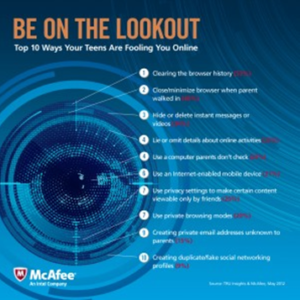70% of Teens Hide Online Activities from Parents—Why We Should be Concerned
Most major media picked up on a study that McAfee released called “The Digital Divide: How the Online Behavior of Teens is Getting Past Parents” that shines a scary light on how much trouble kids are getting themselves in online and how clueless most parents are.
Many people commented saying “I don’t need McAfee telling me kids lie” and I get that. But those who recognize the obvious may not realize the actions and consequences of those lies.
I’ll be the first to admit, and I’ve said this on national TV and radio, I should be buried 6 feet under based on the way I lived my teen years. I lied as a means of survival to cover up my various acts that would have surely got me the belt. But what I did compared to what teens are doing today was a different kind of trouble.
People snicker when they learn that almost half of teens are looking at porn weekly. Really? This is no big deal? It’s true they say “we become what we think about” and a 13-year old isn’t in an emotional or physical position to be consuming hard core violent porn.
Another example is that more than 10% of 13-17 year olds are meeting strangers online then actually meeting them in the real world. I doubt before social media there were as many teenage girls meeting 30-year old men on the street and then getting in his car. But with the Internet these “friends” can seduce teens girls via text or social networking sites and fill her emotional needs until he’s “got her.”
Are you really aware what this hidden behavior and lying is concealing? From the study, McAfee revealed that teens readily admitted to:
Breaking into others’ social media accounts
Hacking and manipulating grades in school
Downloading illegally pirated movies, music and software
Bullying, whether it was actively being a bully, being bullied or witnessing bullying
All of these activities could potentially get you, as parents, involved in numerous lawsuits because of these illegal activities.
This study more than anything points out how outrageous kids are acting online and how oblivious and overwhelmed their parents are. Perhaps Kevin Parrish, journalist and parent of teens from Toms Guidesummed it up best when he said:
“The Internet can be a dangerous place, and allowing teens to run free in a virtual new frontier seemingly run by hackers is just downright insane. Allowing children to do whatever they want online is a huge security risk to your personal data, and a potential legal risk for them. Bottom line, the Internet is a privilege, not a right. Teens should be allowed to express themselves, but not to the point where predators come calling or the FBI comes knocking at the front door. Teens are propelled by emotion, not knowledge and experience, especially early on.”
At least one parent gets it.
Here’s the top 10 ways teens fool their parents. Are you aware of all these?
Robert Siciliano is an Online Security Expert to McAfee



























